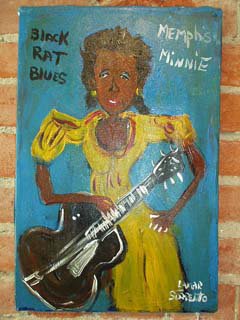Hoodoo You Love

Hoodoo lady, you can turn water to wine
I been wondering where have you been all this time...
-- Memphis Minnie, "Hoodoo Lady"
I been wondering where have you been all this time...
-- Memphis Minnie, "Hoodoo Lady"
She been offline! No, seriously, greetings and welcome. Don't know if this is posting or not, but I'm typing anyway. As you can see, I'm a newhand at blogging, so work with me now, work with me. I got a list on yahoogroups, Anansi: Fiction of the African Diaspora, where some good storytelling folk from 'round the way gather every now and then to exchange info and insights on their literary doings, but this here space is meant to be something different. Black Pot Mojo, my online journal, is a little virtual haven for whatever mischief come to mind, and so I will occasionally post "deep sightings and rescue missions" (thank you, Toni Cade Bambara!) and anything else I find of good interest as I journey along, journey along.
And speaking of Ms. Bambara, I am delighted to have receive from Atria, the newly reprinted edition of Bambara's landmark feminist anthology, The Black Woman. This collection, first published in 1970 by Signet, introduced readers, here and abroad, to phenomenal women voices such as Alice Walker, Paule Marshall, Shirley Anne Williams, Nikki Giovanni, Abby Lincoln, Audre Lorde...yeah, this impressive list goes on... and included essays that voiced a distinct black feminist agenda, a pioneering collection of stories, poetry, and scholarship. Story goes, Bambara was discovered in the slush by Toni Morrison when she was editing at Random House. And what a treasure she found. Bambara later edited The Black Woman in response to the absence of black women's writings about black women, and the collection marked the first time the literary world heard contemporary black women's voices on sexism, racism, and the frustration of being rendered invisible. If you haven't yet had the pleasure of reading Toni's work, whether its her short stories or her novels (and yes, she also wrote films), then run and get yourself copy of her novel, The Salt Eaters or check out Gorilla, My Love.
Her last novel, These Bones Are Not My Child, explored the child murders of Atlanta. At the time of her death in 1995, she had been working on the novel for twelve years. Toni Morrison pruned the manuscript, reportedly 1800 pages long, into a work that reads like classic Bambara, emotionally resonant, intense, disturbing, wise, unforgettable. As someone who grew up in Memphis when folk were dodging every white van in sight, in fear that they too would be snatched up by the Atlanta childkiller, I can tell you this novel hit me hard, brought back memories. Toni Cade Bambara's elegant struggle to make sense of what can't make sense is evident on every page. She don't offer no answers, but the questions, the questions. This is why I read, why I write. Take a(nother) look at her work yourself and let me know what you think.

